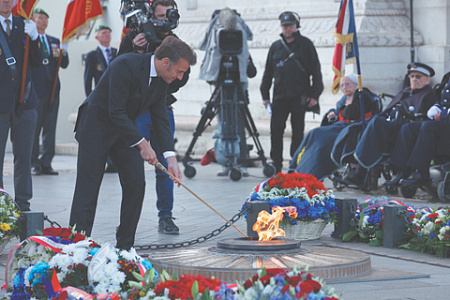
In a move sparking immediate political outrage, French Prime Minister François Bayrou has unveiled a controversial budget plan aimed at tackling the nation’s staggering public debt, proposing to freeze pensions and benefits and, most provocatively, eliminate two public holidays, including Victory in Europe Day.
At a press conference outlining the government’s fiscal strategy, Bayrou detailed plans to save approximately €43.8 billion. The most contentious proposal involves cancelling two spring holidays to boost productivity. The first is Easter Monday, argued to lack significant religious importance, and the second is the May 8th commemoration of the end of World War II in Europe. Bayrou suggested that the French have too many days off in May, which already includes Labour Day and Ascension Day. While the proposal’s full scope remains unclear, it could potentially end not just the public holiday but also the traditional presidential ceremony involving a military procession and the rekindling of the eternal flame at the Arc de Triomphe.
The austerity measures extend beyond public holidays. Bayrou has called for a freeze on pensions and social benefits at their 2025 levels, effectively a real-terms cut for recipients. Furthermore, a general freeze on state spending is planned under the motto “not one euro more,” with notable exceptions for debt repayment and a military budget increase previously announced by President Emmanuel Macron. To shore up revenue, the government also intends to introduce a new “solidarity contribution” targeting the country’s wealthiest individuals, though specifics on who will be affected and by how much have yet to be detailed.
The proposals have ignited a firestorm of criticism from across the political spectrum. Olivier Faure, head of the Socialist Party, decried the package as “not a recovery plan, but a plan for the destruction of the French social model.” Marine Le Pen, leader of the far-right National Rally, threatened a vote of no-confidence, accusing the government of “attacking the French people, workers, and pensioners, rather than eradicating wastefulness.” The far-left La France Insoumise party also voiced its strong opposition.
Interestingly, the political and public backlash has focused more on the economic measures than the potential loss of holidays, signaling that the nation’s primary concern is its economic future. The deep divisions within France’s fragmented parliament, where the government lacks a stable majority, heighten the risk of a full-blown political crisis. Reaching a consensus on any major issue remains a significant challenge, though the possibility remains that Macron and Bayrou could negotiate a compromise with the opposition to begin the long process of fiscal consolidation.
According to Sergey Fedorov, a leading researcher at the Institute of Europe at the Russian Academy of Sciences, President Macron is likely to stand by his prime minister’s unpopular initiatives, albeit with potential adjustments. “Of course, the measures are unpopular and bring no joy to anyone,” Fedorov noted, explaining the opposition’s threats of a no-confidence vote. However, he argues that the alternative—toppling the government—would plunge the country into even greater chaos, a reality most political parties understand.
Fedorov believes that major opposition forces may ultimately show restraint. He suggests the National Rally might hesitate to trigger a government collapse, partly due to Marine Le Pen’s own legal vulnerabilities as she appeals a conviction for misuse of EU funds. An adverse ruling could bar her from holding office for five years, incentivizing her to avoid escalating the political situation. In contrast, Fedorov posits that the far-left, led by Jean-Luc Mélenchon, may be more inclined to risk instability, gambling that a worsening crisis and potential snap elections could boost their party’s standing.
